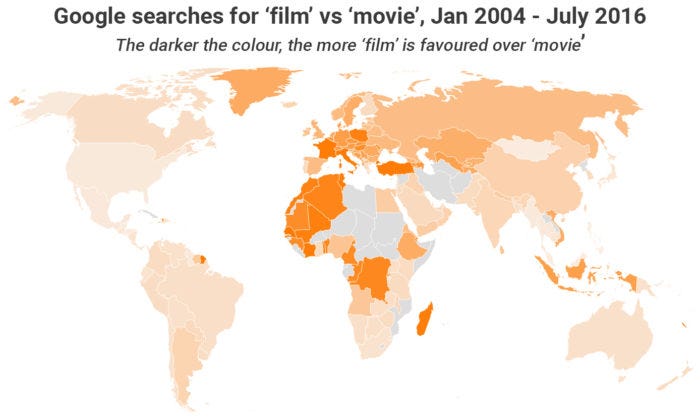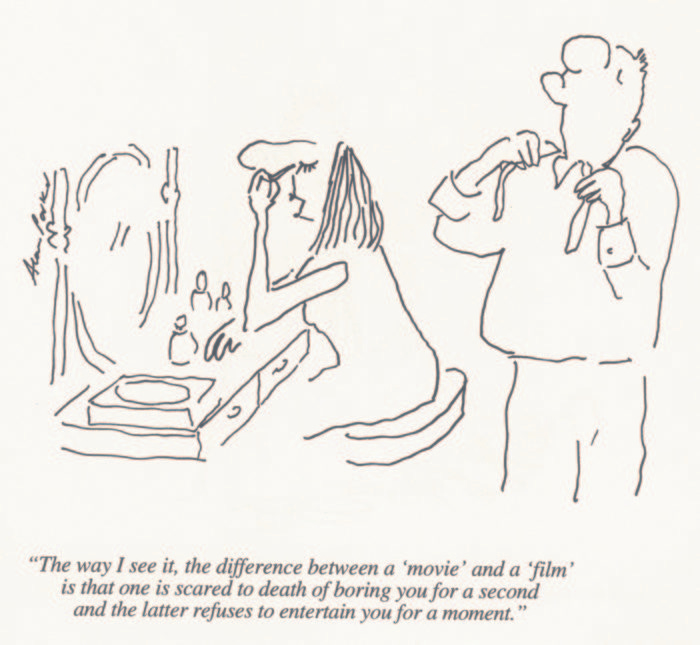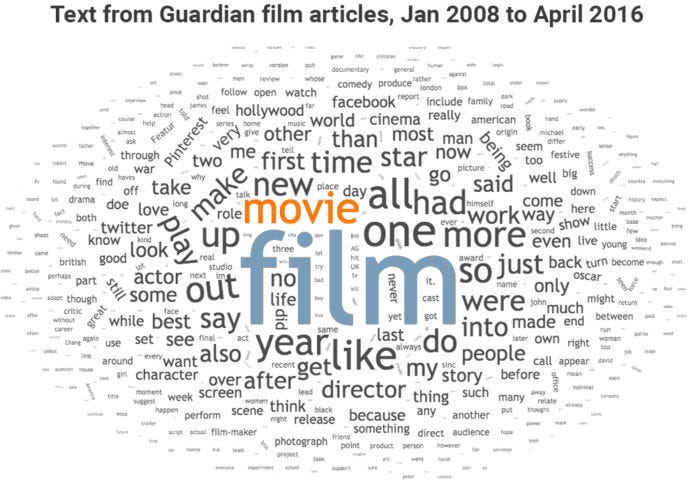In the last few weeks I have been writing articles about big budget Hollywood blockbusters and in doing so I have faced a linguistic dilemma. Until now, I almost exclusively used the term film on this blog, rather than movie. It somehow felt more appropriate and mirrored the conversations I have in the industry. However, it sounds strange to refer to 'Fast & Furious 7" as a film rather than a movie, so I opted to talk about "Hollywood movies" in those articles.
Now I'm back to writing about things other than Hollywood blockbusters and I find myself... confused. Which is the better phrase? Which of the two do most people use? What do they even mean?
So, as regular readers would expect, I have turned to the data to have a look at which term is most commonly used. It seems we need to split this question down into three smaller questions:
Professionals vs Public - Which term is more freely used by the industry and among the general public?
Location - Does the choice of term differ between countries?
Meaning - How are the two terms used?
Industry professionals
Over the years I have conducted many interviews and surveys with industry professionals and so I went back to all the answers I got to open-ended questions. I looked at all 3,198 responses, checking for usage of the terms film and movie and grouping the results by the industry sectors the respondents worked in.
82% of the time people used either of the terms film or movie, they opted for film. The most liberal users of movie work in post-production but even they favour film to movie three-quarters of the time.
Industry press
At the start of last year I performed a big research project into the film industry press, and so I was able to analyse my cache of 239,720 industry headlines for uses of the terms film and movie.
The results were very similar, with four times as many headlines featuring film than those using movie. The UK-based publication Screen International used the term movie very infrequently (in just 115 of the 20,019 articles I looked at), foreshadowing a geographic component to this debate which I will address in a moment.
Popular press
It's not possible for me to survey all newspapers but I wanted to take a look at least one major newspaper, to see where they sit on the film vs movie debate. I opted for the Guardian, as I felt that of all UK newspapers, they cover the largest number of media stories. I gathered data on all 10,282 articles in their film section between January 2008 and April 2016.
By looking at the headlines, we're able to see that they too opt for film over movie, 82% of the time. Interestingly, they are using movie more frequently in recent years. In 2010 only 8.4% of the headlines feature movie over film, whereas by the start of this year that has risen to 26.8%.
The chart above only looks at the headlines so I wanted to spot-check to make sure that the text within the articles told the same story as the headlines. I couldn't break the data down by year due to the volume (over 5.4 million words!), but I was able to calculate that film is used in place of movie 74% of the time (i.e. very similar usage as within headlines).
Below is a word cloud made from all articles published in the Guardian Film section between January 2008 and April 2016 (the more frequently a word is used, the larger is appears).
Civilians
Let's widen our net further and look at the general public. By using the Reddit N-gram tool, we are able to track the usage of the terms film and movie across all of Reddit. This shows between October 2007 and July 2015, movie was used 73% of the time and film only 27% of the time.

I widened our study to look at all Google searches, by using the Google Trends tool. I downloaded data on searches of the phrases film and movie across 208 countries and territories, from January 2004 to July 2016. Movie is the clear winner, with an average of almost twice as many searches as film.

Regional Differences
With the Google data for so many countries, it's possible to look at how usages for each of the two terms differs across the world. Perhaps the most interesting difference is between the UK and America. In the US, the term movie is used eight times as often as film, whereas in the UK they are as common as each other.

I have put the country-by-country data into an interactive map, but sadly Wordpress doesn't want to embed the chart on this site. Therefore, you can see the full interactive map here and I have pasted a screenshot below.

Here are some of the highlights:
United States - 11% film vs 89% movie
Japan - 14% film vs 86% movie
Australia - 17% film vs 83% movie
Canada - 19% film vs 81% movie
New Zealand - 20% film vs 80% movie
India - 24% film vs 76% movie
Ireland - 38% film vs 62% movie
Russia - 42% film vs 58% movie
Spain - 42% film vs 58% movie
United Kingdom - 47% film vs 53% movie
Germany - 63% film vs 37% movie
France - 87% film vs 13% movie
Italy - 87% film vs 13% movie
When we group the countries by continent we can see that film is holding its own in Europe and Africa but overwhelmed in the Americas.

The difference in meaning
In the strictest sense, both terms can be used interchangeably. Dictionaries describe both words as describing a feature film and the Wikipedia page for Movie automatically forwards to the page for Film. However, common usage implies a subtle difference. I will leave it to the wonderful Alan Parker to explain the difference via a cartoon from his superb book Will Write And Direct For Food (the books is a must-own for all film professionals and can be bought on Amazon).

Conclusion
This quick dive into the data won't end the debate between the two terms, but it has shown us three things:
The people working in and reporting on the industry favour the term film
In the US, the term movie is much more often used than film.
In the UK it's pretty much a tie between the two phrases
Movie wins in the Americas but is on a par with film in Europe and Africa.
Notes
It should be noted that the word film has other meanings than just a feature film, whereas the word movie is only used to mean a feature film (at a stretch you could say it also describes the act of going to see a film, as in "We're going to the movies"). When looking at the industry and press usage, it's extremely unlikely that the word film was being used to refer to anything but a feature film. The same cannot be said of the Google search but sadly there is no way to disentangle the irrelevant searches.
I could not control for population in my Google search data (meaning that my continents chart is one-country-one-vote), nor could I take account of cultural influences.






